Books of Interest
Below is a selection of recently published books relevant to social constructionist, relational, and appreciative theory and practices. You may also want to explore:
- Books by Taos Institute Founders, Board Members and Associates
- Non-English Books: books written or translated in languages other than English
- Open Access Books: books available online, most are free to download
- Other Books of Interest: a greater selection of books that may be of interest
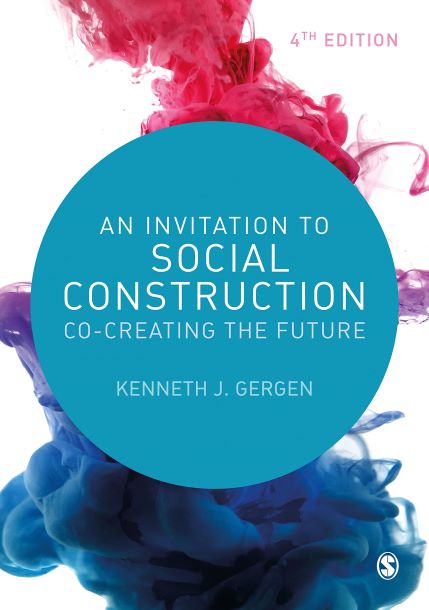
An Invitation to Social Construction: Co-Creating the Future Fourth Edition
SAGE Publications, 2023
Author: Kenneth J. Gergen
This fully updated fourth edition of Gergen’s An Invitation to Social Construction introduces you to a key theoretical movement in contemporary social science through a wide range of multidisciplinary examples.
The fourth edition includes:
- wider consideration of contemporary global challenges,
- increased coverage of media, digital culture, and relevant political issues,
- updated real-world examples of social constructionist theory in action, in research, education, therapy, organizations, and peace building.
This book brings together complex theories that inform and critically build upon social constructionism, such as narratology, deconstruction, dialogism, positivism, and post-structuralism, in a way that is accessible for students and researchers alike. It is a vital resource for those studying social psychology and critical social psychology who are looking for a comprehensive guide to one of the core topics in the field.
SPECIAL OFFER: Use promo code TAOSINST25 to receive a 25% discount on the book purchase at Sagepub.com. Also available at ebooks.com. Valid through 2023.
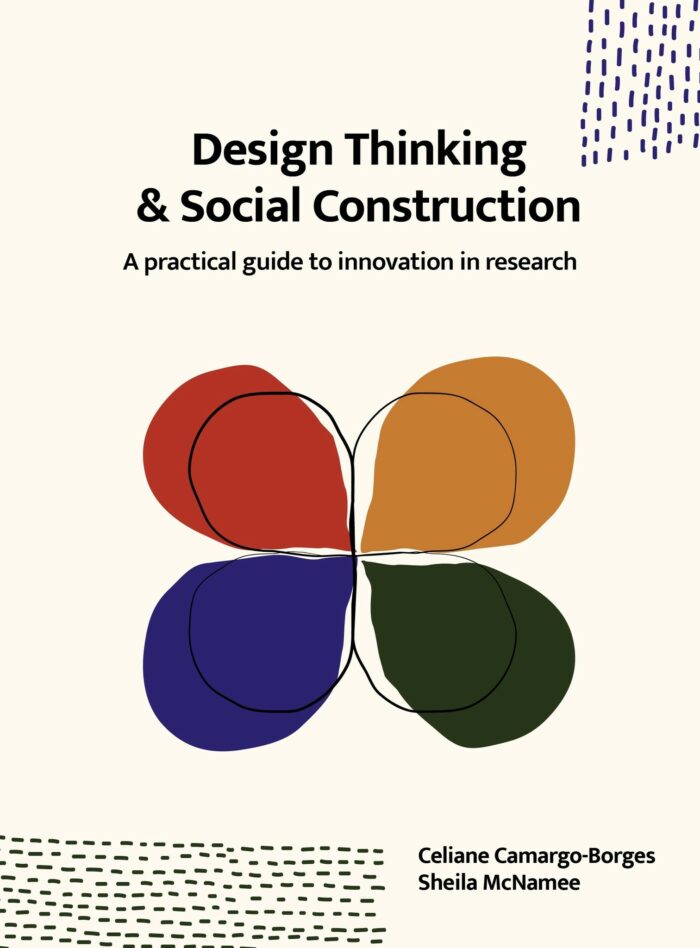
Design Thinking and Social Construction – A Practical Guide to Innovation in Research
BisPublishers, 2022
Authors: Celiane Camargo-Borges and Sheila McNamee
The book introduces the Constructionist Research Design Process as a framework for research that is creative, transformative and innovative. It can be used by any professional and researcher who wants to develop creative inquiry and to promote social change.
It integrates the theory of social construction with the tools of design thinking, challenging the concept of dualisms in research such as quantitative/qualitative and subjective/objective. The focus is on the complex relational achievement required to construct a worldview where different relational (research) processes construct different realities (knowledge).
In this sense, all truths are contextual truths, co-created in a specific time and useful to a specific context.
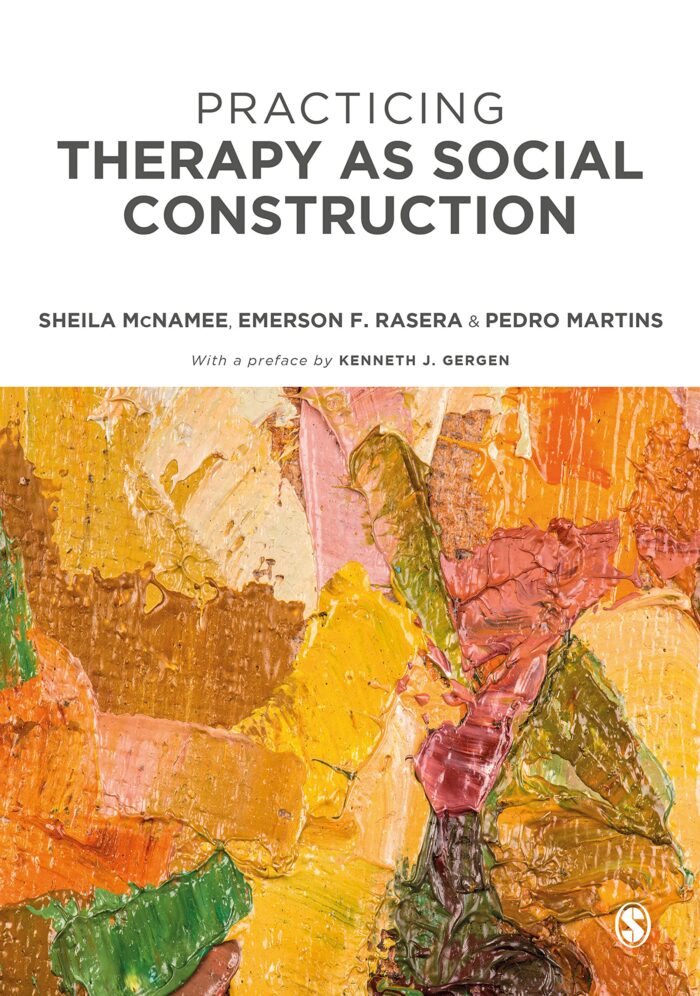
Practicing Therapy as Social Construction
SAGE Publications Ltd, 2022
Authors: Sheila McNamee, Emerson Rasera, and Pedro Martins
This book is a comprehensive introduction to social constructionist ideas and their application within the psychological therapies.
Whether you are a trainee or qualified therapist, this book will support you to think about therapy as a socially constructed and relational process, and to develop as a more culturally, socially and politically aware practitioner. It advocates for ‘therapist activists’ who understand the interplay between the micro and the macro in therapeutic contexts and debunks the idea of the ‘isolated client’ to examine how broader societal conditions create problems for the individual. Chapters are designed to engage, offering a variety of features to support learning, including:
- Introductory and concluding chapter summaries
- Textboxes summarising content & spotlighting key information
- Case studies and vignettes throughout
- Reflective questions & thought-provoking exercises
- Recommended Further Reading.
This book has wide applicability, with author affiliations across both North and South America – the University of New Hampshire in the US and the Federal University of Uberlandia in Brazil.
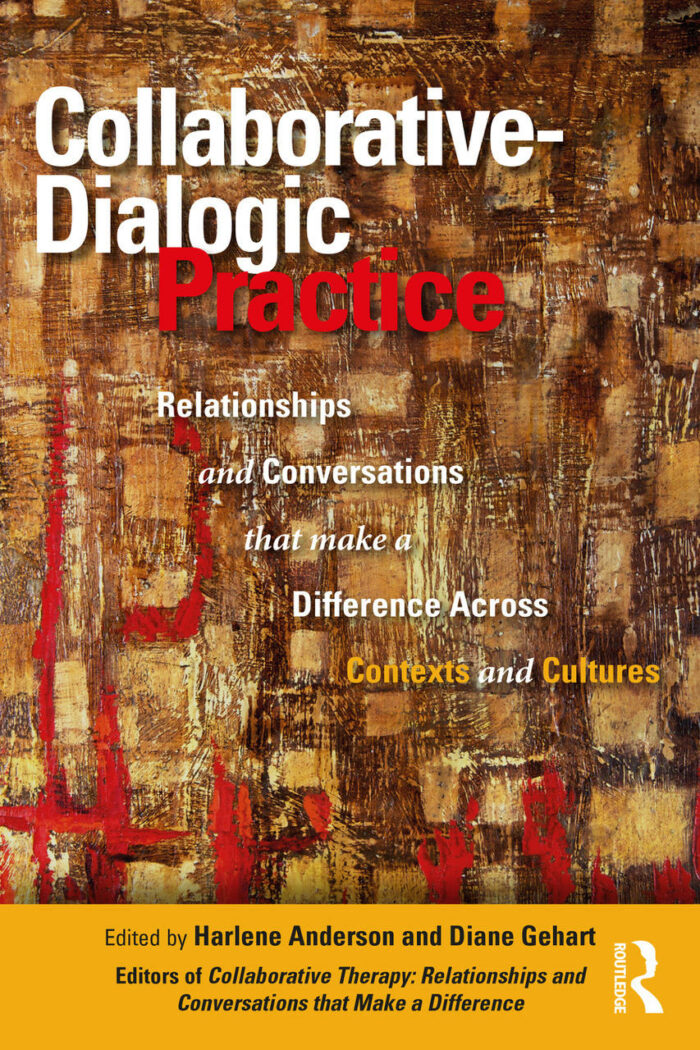
Collaborative-Dialogic Practice: Relationships and Conversations that Make a Difference Across Contexts and Cultures
Routledge, 2022
Editors: Harlene Anderson, Diane R. Gehart
Collaborative-Dialogic Practice provides professionals a humanizing approach in facilitating transformative dialogues with their clients, making a difference, and creating surprising possibilities in our fast-changing, diverse, and ever-shrinking world.
Written alongside a collection of international experts, Harlene Anderson and Diane Gehart introduce collaborative-dialogic practice as a way to encourage relationships and conversations that create generative space and promote meaningful changes in clients, even in the most difficult situations. Split into theory and practice, Part 1 introduces collaborative-dialogue and locates it within traditional and contemporary challenges and practices, providing an overview of its conceptual framework. Chapters in Part 2 then detail the practice in a variety of contexts, cultures, and diverse populations, illustrating how readers can translate the concepts to their distinctive practice settings, and their clients’ unique situations.
Accessible and applicable, this book will be an essential resource and guide for professionals in diverse contexts, cultures, and disciplines, including counselors, psychotherapists, consultants, leaders, mentors, educators, and trainers.
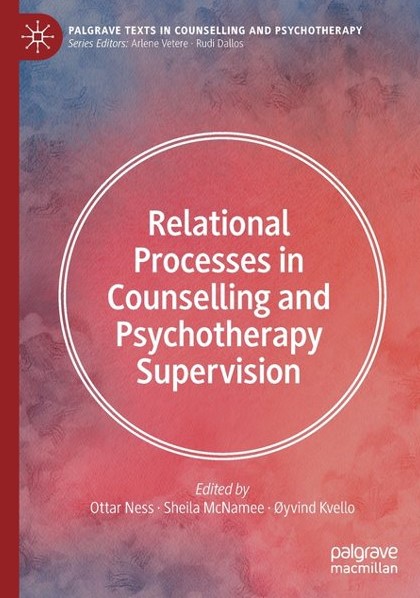
Relational Processes in Counselling and Psychotherapy Supervision
Palgrave Macmillan, Cham, 2021
Editors: Ness, Ottar; McNamee, Sheila; & Kvello, Øyvind
This book is focused on relational processes in supervision for counselling and psychotherapy. The aim is first to introduce a relational theoretical stance, then to apply that stance to the process of supervision, and finally to offer practitioners immediately accessible resources for relational supervision. Within a relational perspective, supervisor and supervisees are viewed as partners who co-construct the supervisory process. Unlike other approaches to supervision where the emphasis is on specific techniques and strategies for supervision, the relational orientation of this book invites supervisor and supervisee into different understandings of the supervisory interaction. This orientation directs our attention to the importance of co-creating the therapeutic relation/alliance with special attention to the wellbeing of the the supervisee and the supervisor. Supervision, from this perspective, is focused on what participants are making together rather than on the individual abilities, strengths, and weaknesses of either the supervisor or the supervisee.
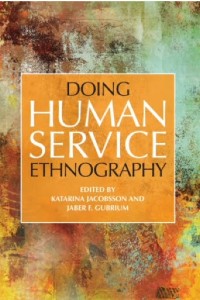
Doing Human Service Ethnography
Policy Press, 2021
Edited by: Katarina Jacobsson and Jaber F. Gubrium
Human service work is performed in many places – hospitals, shelters, households – and is characterized by a complex mixture of organising principles, relations and rules. Using ethnographic methods, researchers can investigate these site-specific complexities, providing multi-dimensional and compelling analyses. Bringing together both theoretical and practical material, this book shows researchers how ethnography can be carried out within human service settings. It provides an invaluable guide on how to apply ethnographic creativeness and offers a more humanistic and context-sensitive approach in the field of health and social care to generating valid knowledge about today’s service work.
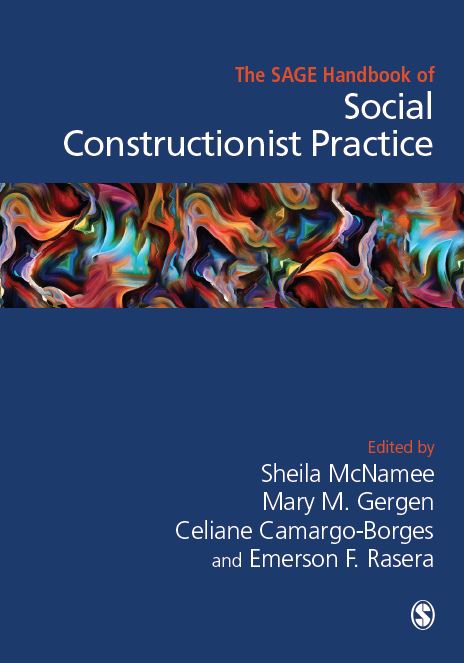
The New Sage Handbook of Social Constructionist Practices
SAGE Publications, 2020
Editors:
Sheila McNamee– Taos Institute Board Member, University of New Hampshire, USA
Mary M. Gergen– Taos Institute Board Member,Pennsylvania State University, USA
Emerson F. Rasera, – Taos Institute Associate,Federal University of Uberlândia, Brazil
Celiane Camargo-Borges– Taos Institute Board Member, Breda University of Applied Sciences, Netherlands
The SAGE Handbook of Social Constructionist Practice is a celebration of voices from the Taos Institute. This new book is a major review of social construction, one of the main theoretical approaches within the social sciences to emerge out of the turn of the 20th century. This volume showcases the latest theory and application of social construction across a range of disciplines. This review of the field is timely and exhibits the latest research whilst also pointing to future directions. The handbook brings together work from a range of disciplines and focuses on real-world practice in addition to theoretical work, thus making it useful for advanced students, scholars, and practitioners alike.
Order the book today. Save 25% with promo code TAOS20
Watch the Dialogue with the Authors and book launch.
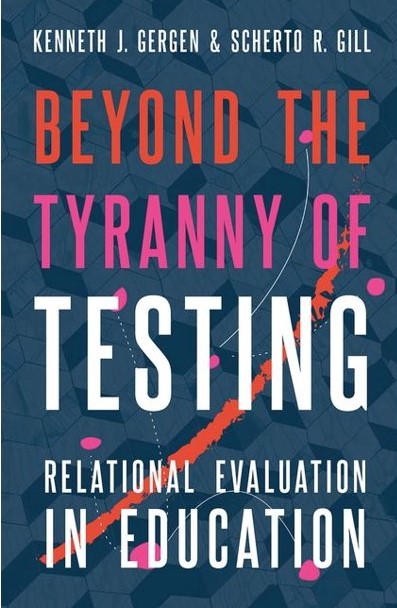
Beyond the Tyranny of Testing: Relational Evaluation in Education
Oxford University Press, 2020
Authors: Kenneth J. Gergen and Scherto Gill
Practices of assessment in education are byproducts of a bygone era. As grades and test scores now become the very goals of education, learning suffers, along with the well-being of both students and teachers. Proposed here is an alternative to the assessment tradition, in which schools no longer function as factories, but as sites of collective meaning making. It is within the process of relating that the world comes to be what it is for us.
We draw from this process our understandings of the world, of what is rational and good. Both learning and well-being are thus the outcomes of relational process. Assessment practices undermine this process. A relational orientation to evaluation is thus proposed, emphasizing evaluation as coinquiry and value creation. The aim is to stimulate learning while simultaneously enriching the vitality of relational process. A wide range of innovations in evaluative practice bring these ideas to life. Detailed illustrations are drawn from both primary and secondary schools, demonstrating how evaluation can foster an engagement in learning and relating. A relational orientation also applies to evaluating teachers and schools. Teacher evaluation is transformed into professional development, while school evaluation becomes a means of building learning communities. A relational shift in evaluation also opens a space for the full flourishing of interactive and dialogic based teaching practices, and more flexible and varied curricula. Such a transformation in education speaks to the demands of a rapidly changing and unpredictable world, in which skills in collaboration are imperative.
Order the book today. Save 30% with promo code ASPROMP8
